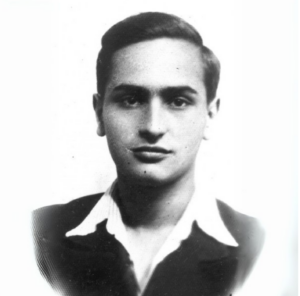Shmuel Breslaw (1920 – 1942)
Leader of the Ha-Shomer Ha-Tzair movement, journalist and editor, resistance fighter, co-founder of the Jewish Combat Organization (ŻOB).
Shmuel (Szmul) Breslaw was born on March 20, 1920, in Moscow. He grew up in an affluent, intellectual family as the son of Lippa and Rachel (née Ludwinowska). He had three siblings: a sister, Dina, and two brothers, Fino and Józef. In 1925, the family moved to Warsaw, where Shmuel began his education at the prestigious Jewish secondary school Chinuch, which taught in both Polish and Hebrew.
At the age of 11, he joined the left-wing Zionist youth organization Ha-Shomer Ha-Tzair. He quickly became the leader of one of the local chapters (gdud) and a member of the Warsaw district leadership.
His fellow member, P. Grynsztejn, remembered him as an outstanding youth counselor, expedition organizer, and active member of the drama group:
“Shmuel stood out with his intelligence, capabilities, and breadth of knowledge. There was no cultural event in which he didn’t participate. […] He often published both serious and humorous newsletters, of which he was the sole editor. […] Despite being more intelligent than others, he remained approachable and understood by his peers. He was an advisor and teacher to those who lacked knowledge and experience. He was the heart of every debate and conversation. Shmuel was wholeheartedly devoted to the cause of Ha-Shomer. When financial issues arose in the group, he began tutoring students and donated the money to help maintain the organization’s premises.”
In 1938, together with Mordechai Anielewicz, he co-organized Jewish self-defense groups in response to anti-Semitic violence from radical right-wing groups such as the National Radical Camp “Falanga”. He was also a contributor to the journal Młody Czyn, writing articles on international politics. After finishing school, he planned to study at university and later emigrate to Palestine, as his brother had done in 1940. The outbreak of war, however, derailed those plans.
On September 7, 1939, following the German invasion of Poland, a meeting of the Warsaw Ha-Shomer leadership was held, during which Shmuel was entrusted with transporting the organization’s banner to safety. Alongside many other Jewish activists, he traveled east to Vilnius, which at the time was seen as a haven for Jewish organizations.
In early 1940, he returned to Warsaw voluntarily—to reunite with his family and support the Jewish community. He immediately became involved in underground activity. For about a year, he traveled across various cities, establishing local Ha-Shomer centers. He attempted to set up underground operations in the Łódź ghetto, but though he managed to enter the ghetto, he returned unsuccessful—German control there was far more restrictive.
He settled permanently in the Warsaw Ghetto in early 1941, where he became the key organizer of a secret radio listening station, operated together with Mordechai Anielewicz, Mira Fuchrer, and Towa Frenkel. His knowledge of Russian proved useful for monitoring broadcasts from both the Western Allies and the USSR. Based on those broadcasts, they compiled 2–3-page bulletins informing ghetto residents of world events. Breslaw edited and distributed most of these reports, many of which bear his signature.
He dominated underground journalism in the ghetto—writing, editing, mentoring others, and also handling technical aspects of printing and distribution. He was the editor of the clandestine newspaper Neged Ha-Zerem (“Against the Current”) and other Ha-Shomer publications. He transcribed letters dictated by Mordechai Anielewicz and could compellingly and literarily convey the author’s key ideas. Historian Israel Gutman noted that although the two once competed for leadership positions, during the war Breslaw and Anielewicz became close friends and collaborators.
Shmuel also worked with Emanuel Ringelblum and the Oneg Shabbat archive. He left behind numerous Polish-language documents, including an interview with Irena Adamowicz on Polish-Jewish relations and reports on abuses in food ration distribution. Within Oneg Shabbat, he investigated the condition of youth in the ghetto and analyzed broader social attitudes.
He was a man of broad knowledge and interests—an avid reader, politically astute, and informed on geopolitics, on which he wrote regularly. He also lectured at seminars organized by Ha-Shomer.
Deeply committed to the resistance, he conducted self-defense workshops in the ghetto. He took pride in fulfilling the mission of Ha-Shomer despite the extreme conditions. P. Handelsman, who corresponded with him after his departure from Vilnius, wrote:
“His letters were full of hope and faith in the Jewish people’s future. […] In one letter to our kibbutz, he wrote: ‘I don’t consider the difficulties. I feel it is my sacred duty. I am a product of the Ha-Shomer movement, which has always been the vanguard of Jewish youth, and precisely now, in these days, I must be where help and guidance are most needed. Dark days lie ahead for the Warsaw Ghetto.’”
On July 22, 1942, the Germans launched the so-called Grossaktion—the mass deportation of Jews from the Warsaw Ghetto to the Treblinka extermination camp. In the first days of the operation, a meeting was held by members of Dror He-Chalutz, an organization to which Shmuel also belonged. Attendees included Tzivia Lubetkin, Yitzhak Zuckerman, and Józef Kaplan. For the first time, the possibility of armed resistance was discussed. The group already knew the transports were headed to an extermination camp—knowledge that was not yet widespread among the ghetto population. Hela Rufeisen later described the meeting in her memoir, recalling Shmuel’s words:
“We must attack the German guards with knives, iron bars, daggers, anything we can find—rally the crowd and escape to the Aryan side.”
However, most present agreed that weapons needed to be secured first and the population informed about the true purpose of the deportations.
On July 28, 1942, several pioneering Jewish youth organizations formed the Jewish Combat Organization (ŻOB). Shmuel Breslaw took part in the founding meeting as a representative of Ha-Shomer, along with Józef Kaplan, and became a member of ŻOB’s High Command. In the first week of August, the organization received its first weapons shipment (via the Gwardia Ludowa resistance), carried out sabotage actions, and attempted to assassinate Józef Szeryński, the commander of the Jewish Ghetto Police.<p>
On September 3, 1942, ŻOB suffered a severe blow—Józef Kaplan was arrested after a security breach. Shmuel attempted to find out where he was being held and planned a rescue. He went out into the city, defying the curfew for Jews. He was spotted and detained by German forces. When asked for his documents, he lunged at an armed soldier with a knife. He was shot and killed on the spot.
On September 4, 1942, his funeral was held at the Jewish Cemetery on Okopowa Street. Emanuel Ringelblum wrote in a brief note:
“The only ones left on the battlefield—the romantics, the idealists. Shmul could not survive the tragedy of the ghetto.”
Leon Najberg, in his book The Last Fighters of the Ghetto, described a gathering of several people in a brush-makers’ workshop on April 17, 1943:
“We discussed the question: Why, at the critical moment, did the ghetto not produce a Messiah? Engineer Szenfeld claimed that the ghetto had a Messiah who knocked on the hearts of Jews, but they did not truly believe his prophecies. That man, according to Szenfeld, was Shmuel Breslaw.”
Of the four Breslaw siblings, two brothers survived the Holocaust. Fino, who emigrated to Palestine in February 1940, settled in Israel and became one of the founders of Kibbutz Amir. Józef later settled in France. Their sister Dina, along with their parents, was deported to Treblinka in 1942 and murdered.
Bibliography:
Ringelblum Archive, v. 22, Prasa getta warszawskiego: wiadomości z nasłuchu radiowego, Warszawa 2016.
Ringelblum Archive, v. 29,
Pisma Emanuela Ringelbluma z getta, Warszawa 2018.
Gutman I., „Resistance: The Warsaw Ghetto Uprising”, Warszawa 1998.
Gutman I., „Mered hanetsurim: Mordekhai Anilevits wemilhemet geto warsza, Jerozolima 2013.
Najberg L., „Ostatni Powstańcy Getta”, Warszawa 1993.
Rufeisen-Schupper H., Farewell to Miła 18: Memoirs of a Liaison of the Jewish Combat Organization, Kraków, 1996
Mosty. Magazine of Haszomer Hatzair in Poland. N 4 (12) 1947.


